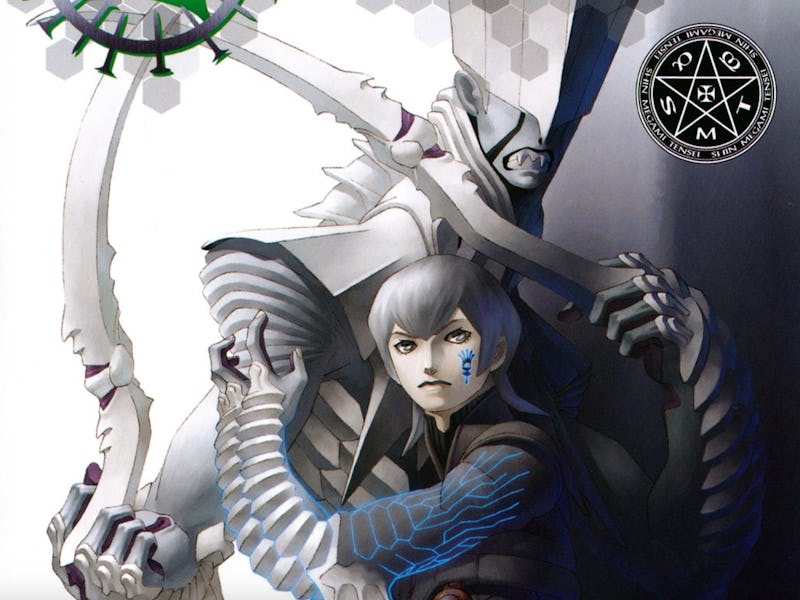It’s Time to Bring Back This Underrated Shin Megami Tensei Spinoff
“For gamers who like games such as Final Fantasy, but are tired of the same old hero-saves-the-world plot, SMT: Digital Devil Saga will satiate their hunger for something new.”

Shin Megami Tensei spawned plenty of spinoffs besides its popular Persona series, but not all of them reached critical acclaim like their high school-based sibling. Shin Megami Tensei: Digital Devil Saga, also known as Digital Devil Saga: Avatar Tuner, is one of the cult classics confined to the PlayStation 2 era without a modern port to endear it to new players. It followed Shin Megami Tensei 3: Nocturne, the game that introduced demon negotiation and skill inheritance to SMT games. Funnily enough, Digital Devil Saga did away with this novel point: It didn’t include demon recruitment or negotiations at all. The demons were the characters themselves.
Shin Megami Tensei: Digital Devil Saga originally launched 20 years ago on July 15, 2004 in Japan before coming to North America on April 5, 2005. It was followed swiftly by a sequel, Digital Devil Saga 2, on January 27, 2005 in Japan and October 3, 2005 in North America to complete the story. Two decades later, it’s worth taking a look back at this underrated addition to the sprawling Atlus franchise.
Shin Megami Tensei games in general tend to cover themes of religion, spirituality, and higher power.
Digital Devil Saga takes place in a world called The Junkyard where five tribes are constantly warring with each other for entry to a mysterious paradise called Nirvana. Serph, the protagonist, and his four party members represent the Embryon tribe. Early in the story, they are infected by a demon virus that enables them to devour others and transform into their own demonic forms during battle. Unfortunately, these newfound powers also take a toll on their mental state. Sera, a mysterious girl with the power to calm their inner demons, becomes a key character in preventing them from losing themselves.
Shin Megami Tensei games in general tend to cover themes of religion, spirituality, and higher power to some extent. Digital Devil Saga is no different. It confronts the morality behind eating others to survive, and, to a broader extent, survival of the fittest. Serph often chooses between cold, calculated plans that don’t take into account others outside his tribe, or merciful choices that defy their demon-eat-demon world.
“Digital Devil Saga was designed to make the franchise more appealing to a broader audience,” Atlus USA’s Bill Alexander told IGN in a 2005 interview. “The developer, our parent company, hoped to expand its audience in both countries by making the game more appealing and accessible to mainstream gamers, while staying true to its roots… For gamers who like games such as Final Fantasy, but are tired of the same old hero-saves-the-world plot, SMT: Digital Devil Saga will satiate their hunger for something new.”
DDS represented a major departure for the series’ turn-based formula.
That’s not the only separating Digital Devil Saga from its contemporaries. Atlus has a habit of reinventing its turn-based formula for each spinoff, rather than reusing a copy-pasted combat system across multiple games, and DDS represents a major departure. Because the DDS characters were demons themselves, they didn’t need to do demon recruitment or negotiations.
That might not have seemed like a big deal back when SMT 3: Nocturne was the only SMT game to feature demon negotiations, but now that basically every MegaTen game includes it, DDS stands out as an anomaly. Turning DDS’ characters into demons also enabled them to have a more personalized skill tree, because you can mix and match their equipped demon abilities instead of swapping out different demons in your party. All of that means DDS still stands as one of the MegaTen games with the most freedom to customize your skill kit.
Will there ever be a Digital Devil Saga remaster or revival?
Sadly, Digital Devil Saga didn’t impress on all accounts. While its premise and combat system stood out, critics and players alike harped on the pacing and repetitive encounters, especially in the latter half of the games. DDS is also the kind of series that requires you to play both games to get the maximum enjoyment out of them. DDS1 feels incomplete without DDS2 because of its infamous cliffhanger, and DDS2 assumes you played DDS1 without any handholding.
Digital Devil Saga arguably performed as well as SMT 3: Nocturne, at least based on critical reception. However, it failed to meet the sales targets Atlus had for it. As per Gamasutra, its lukewarm performance contributed to the company’s 2005 fiscal year deficit, leading to layoffs.
That doesn’t mean there can never be a Digital Devil Saga remaster or revival. SMT 3 returned with the Nocturne HD Remaster in 2022, Shin Megami Tensei 5 came out eight years after its last installment, and the long-dormant Soul Hackers series launched its first game in over a decade in 2023. So a DDS rerelease seems likely at some point — assuming Atlus has anything on its mind besides the upcoming Metaphor: ReFantazio and rumored Persona 6, though.
For now, we can only hope.